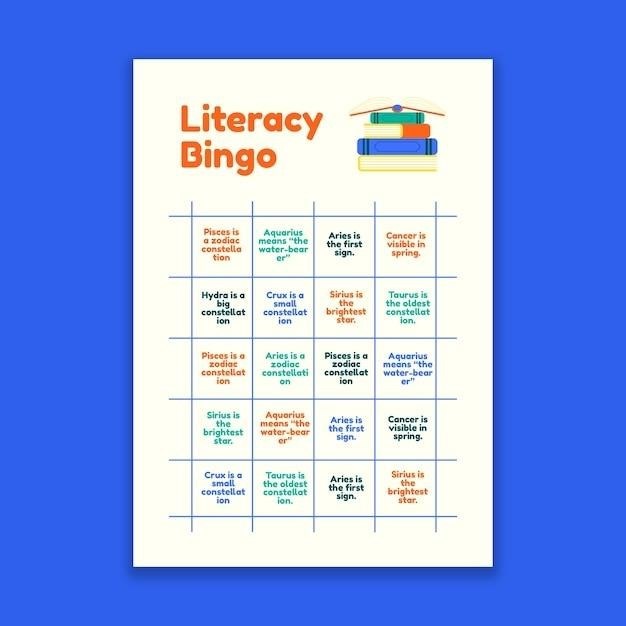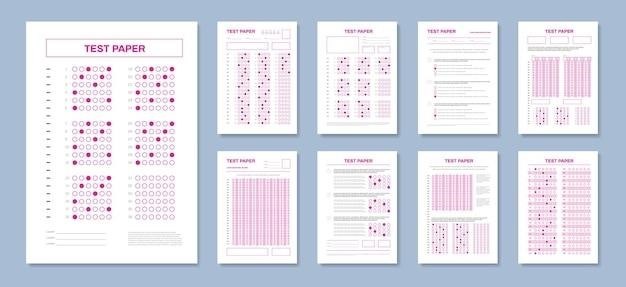LETRS Units 1-4 Post-Test⁚ Overview
The LETRS Units 1-4 post-test assesses knowledge gained from the first four units. It contains 45 multiple-choice questions and is untimed. Passing requires an 80% score; retakes are available for a fee.
Test Structure and Format
The LETRS Units 1-4 post-test is a comprehensive assessment designed to evaluate your understanding of the material covered in the first four units of the program. The test comprises 45 multiple-choice questions, each requiring careful consideration of the presented options. There’s no time limit, allowing sufficient time for thoughtful responses. The questions cover a range of topics, including phonics, reading comprehension, vocabulary development, and literacy strategies. Access to notes or the course manual is permitted during the assessment, providing a valuable resource for recalling key concepts and definitions. Remember to review all materials before attempting the test. The format ensures a thorough evaluation of your acquired knowledge and skills.
Passing Score and Retakes
To successfully complete the LETRS Units 1-4 post-test and achieve the READ Act designation, a minimum score of 80% is required. This signifies a strong understanding of the core concepts presented throughout the four units. Should you not achieve the 80% passing score on your first attempt, retakes are permitted. However, accessing a retake involves contacting Voyager Sopris Learning, the provider of the LETRS program. They will facilitate the process of resetting the assessment for a fee of $49. This fee covers the administrative costs associated with providing a second opportunity to demonstrate mastery of the material. Therefore, thorough preparation before each attempt is strongly advised to avoid incurring this additional expense.
Access to the Post-Test
Accessing the LETRS Units 1-4 post-test typically occurs through the online platform provided by Voyager Sopris Learning, the company that offers the LETRS program. The exact method of accessing the post-test may vary depending on your institution or individual licensing agreement. Usually, after completing Units 1-4, a clear pathway to the post-test will be presented within the online learning environment. This might involve clicking a specific button or link, or navigating to a designated assessment section. It’s crucial to carefully review your course materials or contact your program administrator if you encounter difficulties locating the post-test. Remember to have your login credentials ready, as these will be necessary for accessing the secure assessment platform and completing the examination.
Key Concepts Covered in Units 1-4
Units 1-4 of LETRS focus on foundational literacy skills⁚ phonics, decoding, reading fluency, vocabulary development, and comprehension strategies for beginning readers.
Phonics and Word Decoding
This section of the LETRS Units 1-4 curriculum emphasizes systematic and explicit phonics instruction. It covers the alphabetic principle, grapheme-phoneme correspondences, common consonant and vowel sounds, and decoding strategies for multisyllabic words. The post-test assesses understanding of these concepts through questions requiring application of phonics rules to decode unfamiliar words. Successful completion demonstrates mastery of foundational skills in sound-symbol relationships and their application to reading. Accurate, fast word recognition, a key focus, is essential for reading fluency and comprehension development. The materials provide examples and practice exercises to solidify this understanding.
Reading Comprehension and Fluency
LETRS Units 1-4 emphasize the crucial link between decoding and comprehension. The post-test assesses the ability to understand text at a foundational level, focusing on skills such as identifying the main idea, recalling details, and making inferences. Fluency, encompassing accuracy, rate, and prosody, is another key area of evaluation. Questions might involve analyzing short passages to demonstrate comprehension, requiring students to identify key information and relationships between ideas within the text. The ability to read with appropriate speed and expression, reflecting an understanding of punctuation and text structure, is also tested. This section highlights the importance of both accurate decoding and effective reading strategies for successful comprehension.
Vocabulary Development
A significant portion of the LETRS Units 1-4 post-test focuses on vocabulary acquisition and application. Expect questions assessing understanding of word meanings, both explicitly stated and inferred from context. The test may include multiple-choice items requiring students to select synonyms, antonyms, or definitions. Additionally, questions may assess the ability to use context clues to decipher unfamiliar words within a sentence or paragraph. Knowledge of common prefixes, suffixes, and root words will also be tested, demonstrating understanding of word morphology. The ability to apply learned vocabulary in written or oral contexts is also implicitly evaluated, highlighting the practical application of vocabulary skills. This section emphasizes the importance of rich vocabulary knowledge for overall reading comprehension.
Sample Questions and Answers
While specific questions aren’t publicly available, sample questions mirroring the test’s focus on phonics, reading comprehension, and vocabulary are readily accessible online through various study resources.
Relationship Between Reading Comprehension and Word Decoding
The LETRS program emphasizes the crucial link between accurate, rapid word recognition (decoding) and successful reading comprehension. Proficient decoding allows fluent reading, freeing cognitive resources for comprehension. Struggles with decoding often lead to comprehension difficulties, even with adequate vocabulary knowledge. The ability to quickly and accurately decode words is a foundational skill for building reading fluency and comprehension. Without efficient decoding, readers expend too much mental effort on individual words, hindering their understanding of the text as a whole. Therefore, strong decoding skills are fundamental for developing robust reading comprehension abilities. Effective instruction addresses both areas simultaneously to ensure students develop holistic reading proficiency.
Activities Promoting Literacy Development
Effective literacy development hinges on diverse, engaging activities. Shared reading, where teachers model fluent reading and discuss the text, is crucial. Interactive writing, where students contribute to a collaboratively composed text, builds vocabulary and writing skills. Guided reading, providing individualized support and scaffolding, is beneficial. Word study activities, focusing on phonics, morphology, and orthography, enhance decoding and spelling. Opportunities for independent reading, selecting books at their reading level, foster comprehension and fluency. Conversations about texts, promoting critical thinking and deeper understanding, are key. Engaging in various literacy activities caters to diverse learning styles and fosters a love of reading.
Advanced Word Study Skills (Unit 4 Focus)
LETRS Unit 4 significantly expands upon foundational phonics, delving into sophisticated word study techniques essential for proficient reading and spelling. Students learn to analyze multisyllabic words by identifying common orthographic patterns, understanding syllable types (closed, open, etc.), and recognizing morphemes (meaningful units). This advanced knowledge empowers students to decode and spell complex words encountered in various academic subjects. Mastering these skills allows students to tackle challenging vocabulary with confidence, fostering deeper comprehension and improved writing abilities. The focus shifts from basic phonetic decoding to a more nuanced understanding of word structure and etymology.

Resources for Test Preparation
Utilize online study materials, flashcards, and unit summaries. LETRS provides official support and help; explore available quizzes for practice.
Online Study Materials and Flashcards
Numerous websites offer LETRS Units 1-4 study materials and flashcards. These resources can be invaluable for reinforcing key concepts such as phonics, reading comprehension, and vocabulary development. Look for flashcards that cover key terms and definitions, as well as practice questions mirroring the post-test format. Many platforms allow for customized learning, focusing on areas where you need extra support. Remember to critically evaluate the source’s reliability and accuracy. Supplement these online resources with the official LETRS materials for a comprehensive review. Effective use of these materials can significantly improve your chances of success on the post-test.
LETRS Unit Summaries and Quizzes
Supplementing your studies with unit summaries and quizzes can prove highly beneficial. These resources offer concise overviews of key concepts covered in each unit, acting as an excellent refresher before tackling the post-test. Many online platforms provide such materials, often including practice questions designed to test your understanding of the core ideas. Focus on areas where you feel less confident. By regularly reviewing these summaries and completing the quizzes, you can identify knowledge gaps and strengthen your understanding of crucial topics like phonics, reading fluency, and vocabulary acquisition. This targeted approach can maximize your preparation for the post-test.
Official LETRS Support and Help
Don’t hesitate to utilize the official LETRS support channels for assistance. The program likely offers resources such as a help center or contact information for technical support. These resources can address any questions or concerns you may have about the program’s content, the post-test itself, or any technical difficulties encountered during your studies. Accessing official support ensures you receive accurate and reliable information, directly from the source. This can be particularly helpful if you’re struggling with specific concepts or need clarification on assessment procedures. Proactively seeking support can significantly enhance your learning experience and improve your overall performance.

Frequently Asked Questions
Common questions include the number of questions on the post-test and whether the pre- and post-tests share similar questions. Answers clarify these points and address other test-related concerns.
Number of Questions on the Post-Test
The LETRS Units 1-4 post-test comprises 45 multiple-choice questions. This number is consistently reported across various online resources and study materials. The test is not timed, allowing sufficient time for careful consideration of each question. Remember, achieving a score of 80% or higher is necessary to pass. Many websites offer practice questions and study guides to help prepare for the post-test, increasing your chances of success. These resources often include sample questions and answers, mirroring the style and difficulty of the actual assessment. Thorough preparation significantly improves your chances of passing the exam on your first attempt.
Similarity Between Pre- and Post-Tests
While the provided text mentions both pre- and post-tests, it doesn’t explicitly detail their similarity or differences in question content. Some sources suggest the questions may be the same, while others indicate variations. However, the overall purpose remains consistent⁚ to assess understanding of the material covered in Units 1-4. The structure (multiple-choice format) likely remains identical. The scoring criteria, requiring an 80% passing grade, also appears consistent across both assessments. Lack of definitive information regarding question overlap necessitates caution when relying on pre-test results for post-test predictions. Individual learning experiences and knowledge retention will influence performance, regardless of question similarity.
